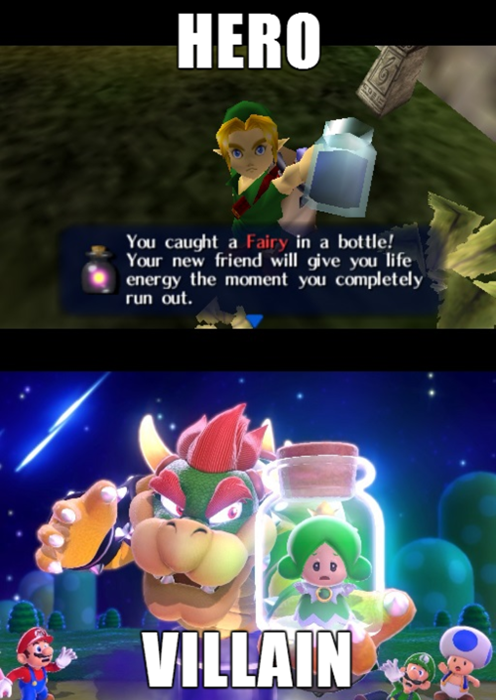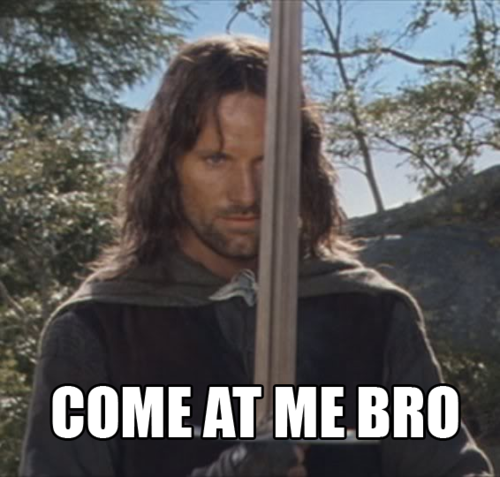And, sometimes the exact same action can be perceived as heroic or villainous, just depending on who is engaging in it -



 Sage
Sage Scribe
Scribe Auror
Auror Sage
SageHeroes are the ones who do the right thing.
Villains are the ones who do the wrong thing.
And no, right and wrong are not subjective.
It's really that simple.
 Auror
Auror Auror
AurorAgree to disagree.
 Istar
IstarHeroes are the ones who do the right thing.
Villains are the ones who do the wrong thing.
And no, right and wrong are not subjective.
It's really that simple.

 Myth Weaver
Myth WeaverHeroes are the ones who do the right thing.
Villains are the ones who do the wrong thing.
And no, right and wrong are not subjective.
It's really that simple.
I very much agree with this. It's become fashionable to blur the distinction between right and wrong, but I'm not exactly cool with that. A world without defined right and wrong isn't complex or "morally ambiguous". It's just amoral. And I can't get behind amorality. And yes, Nagash, this view is very biblical. Another reason I stand by it. Mythopoet may not wish to argue, but I rather enjoy it on occasion.
 Sage
SageI very much agree with this. It's become fashionable to blur the distinction between right and wrong, but I'm not exactly cool with that. A world without defined right and wrong isn't complex or "morally ambiguous". It's just amoral. And I can't get behind amorality. And yes, Nagash, this view is very biblical. Another reason I stand by it. Mythopoet may not wish to argue, but I rather enjoy it on occasion.

 Auror
AurorI don't buy this. If you do the right thing for the wrong reason, are you a hero?
Example: Guy sees puppy on the highway. Dodges cars at great personal risk and saves the puppy. Finds its owner and returns it anonymously. I'd say he's a hero.
2nd Example: Guy sees a puppy on the side of the road and recognizes as belonging to the hot girl living down the street. He stops and picks up the puppy. Uses the return as a foot in the door to seduce the girl. Is he a hero? In the end, the same right thing, rescuing the puppy, was accomplished.
Is a guy who does the wrong thing for the right reason a villian?
Example: Guy robs a bank in order to profit from the loot. He's a villain.
2nd Example: A guy is forced to rob a bank or have his kid killed. Is he a villain?
3rd Example: A guy feels the bank is ripping people off, but, in the made-up story world, he has no legal redress. He robs the bank and gives the money to the people being ripped off. Is he a villain or a hero?
Red soldier kills blue soldier about to slay the red general.
To the red army, red soldier is a hero. To the blue army, he's a villain.
I don't know. It doesn't seem all that simple to me...
I don't know if it's fashionable as much as it's interesting. Blurring the lines between right & wrong creates situations where readers can empathize with both protagonist and antagonist. That is much more in line with our personal reality, and therefore some readers find it inherently more interesting than the good guys wearing white hats, bad guys in black.
Right and wrong, good and evil and the morality of human acts is already so complicated that there is no need to blur any lines. The problem is that our modern society has rejected the complexity that I talked about above and simplified things in a disordered way so as to diminish responsibility for any actions (right and wrong is all in your mind, man) and then rebelled against the simplification while blaming it on those of us who never believed in it in the first place. Modern man is floundering about and has convinced himself that so called "shades of grey" are more realistic and more interesting than the truth. All so modern man can do whatever he wants and blame others for his problems.
 Istar
IstarI don't buy this. If you do the right thing for the wrong reason, are you a hero?
Example: Guy sees puppy on the highway. Dodges cars at great personal risk and saves the puppy. Finds its owner and returns it anonymously. I'd say he's a hero.
2nd Example: Guy sees a puppy on the side of the road and recognizes as belonging to the hot girl living down the street. He stops and picks up the puppy. Uses the return as a foot in the door to seduce the girl. Is he a hero? In the end, the same right thing, rescuing the puppy, was accomplished.
Is a guy who does the wrong thing for the right reason a villian?
Example: Guy robs a bank in order to profit from the loot. He's a villain.
2nd Example: A guy is forced to rob a bank or have his kid killed. Is he a villain?
I would ask, what causes are the red and blue armies fighting for? What personal reasons does the soldier have for killing the general?Red soldier kills blue soldier about to slay the red general.
To the red army, red soldier is a hero. To the blue army, he's a villain.
I don't know if it's fashionable as much as it's interesting. Blurring the lines between right & wrong creates situations where readers can empathize with both protagonist and antagonist. That is much more in line with our personal reality, and therefore some readers find it inherently more interesting than the good guys wearing white hats, bad guys in black.
Perhaps what you are really arguing against is that no one person is either perfectly good or completely irredeemable. With that I can agree. But again, it doesnt invalidate the idea of right and wrong, good and evil altogether.
 Myth Weaver
Myth WeaverIt's really that simple.
Obviously judging the morality of individual human acts is not simple. I didn't say it was.
It's a simplification of the issue to pretend that heroism and villainy let alone right and wrong depend on which side you are on rather than your own personal actions.
A truly good act requires the goodness of the object, the intent and the circumstances.
 Istar
IstarI agree with that in part, as it relates to our reality. However, there are situations that do not fit in your parameters, especially when considering characters & story, which we are.
Consider a case of good versus good. You could have two opposing forces square off against each other, not because one is good and the other evil, but because their competing interests create conflict. The perception of good or evil, may depend on point of view. That may of course be an errant judgment, yet is one that is made everyday, by billions of people.
Further, I never claimed the morally grey is justified or that there aren't delusions involved with its acceptance, only that many readers find the morally grey to be far more interesting than a simplistic portrayal of good versus evil. For myself, that is true precisely for the reasons you stated above. They make me consider points of view and whether or not actions are evil, good, or a wolf in sheep's clothing. The questioning that follows moral dilemma is what many find intriguing & engaging.
I also think it's interesting to consider why a person becomes corrupted, how the wrong choices are rationalized, & how moral ambiguity can make the descent to evil not only excusable to some people (and the self), but also almost imperceptible....until we are too far gone. I don't see that much potential in black vs. white.
 Sage
SageWe are not, however, trying to determine a good act, but whether one is a hero. If a person believes the act to be good, has good intentions, and pursues achievement of the act under heroic circumstances, isn't he a hero even if it turns out tthat the act isn't really good, that he was mistaken?
 Myth Weaver
Myth WeaverHeroes are the ones who do the right thing.
Villains are the ones who do the wrong thing.
And no, right and wrong are not subjective.
It's really that simple.
All you've proven is that right and wrong are sometimes difficult to distinguish, a fact I do not contend. You have not proven that there is no such thing as right or wrong to begin with.
 Istar
Istar*snip*